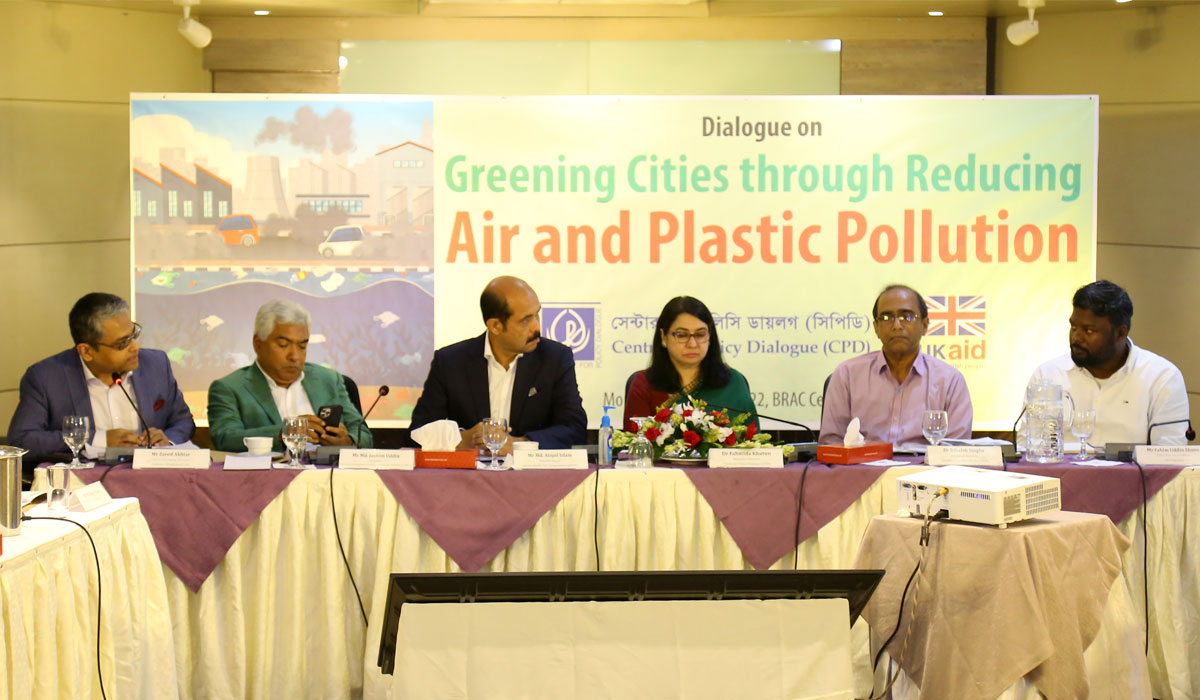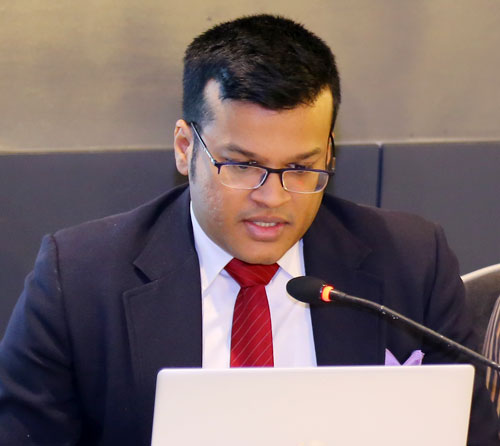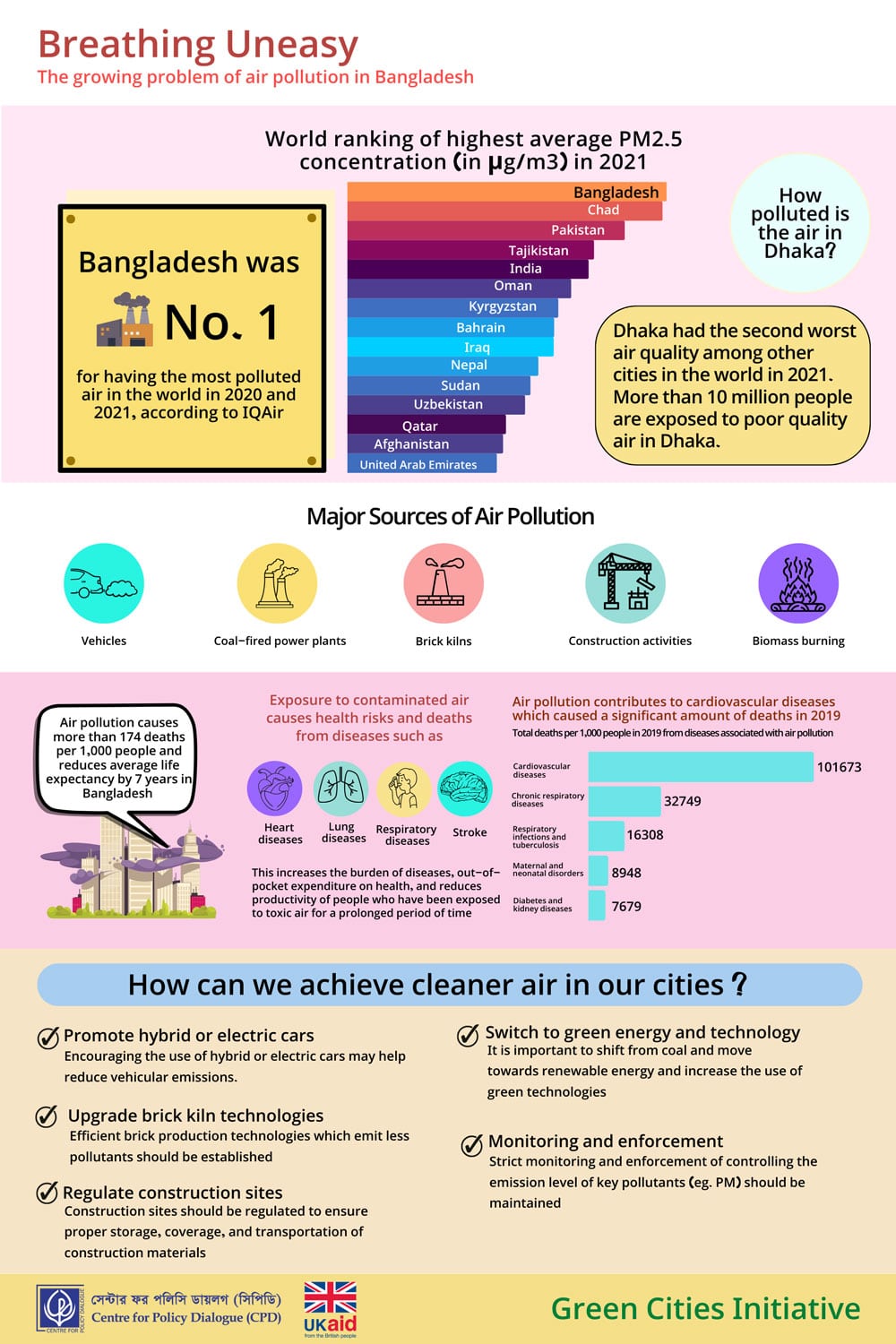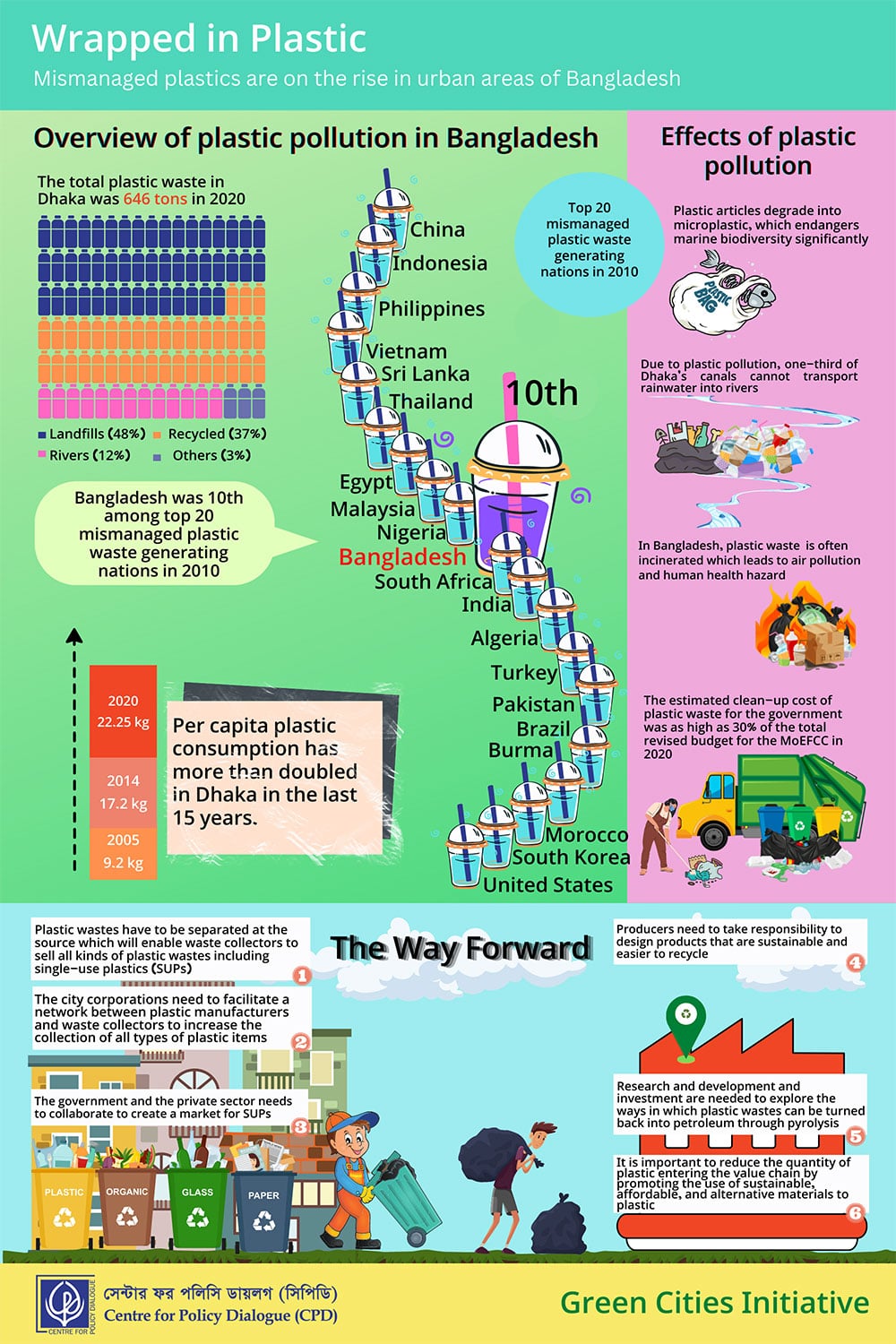
With higher industrialisation, urbanisation, and energy consumption in major cities, air and plastic pollution are posing serious health, environmental, and economic risks to Bangladesh’s development journey. Research shows that, urbanisation is linked to higher greenhouse gas (GHG) emissions and higher annual average temperature change. As more people relocate to cities, their carbon footprints grow larger. Among various types of pollution, air and plastic pollutions are acute in the large cities of Bangladesh. According to IQAir, Dhaka was ranked as the second most polluted city in the world after New Delhi in the Regional Capital City Ranking in 2021 for its air quality. In addition, plastic pollution is on the rise with the escalation of urbanisation.
In the above-mentioned context, the Centre for Policy Dialogue (CPD) has undertaken a study titled “Green Cities Initiative” with the aim to make cities green and environment-friendly through the reduction of pollutions from air and plastic. Based on this study, a dialogue was organised by CPD on Monday, 31 October 2022.
 On behalf of the study team, Mr Syed Yusuf Saadat, Research Fellow of CPD, delieverd the keynote presentation based on evidence on the relationship between air and plastic pollution, and public health in the economy of Bangladesh. He mentioned that the objectives of the study are to identify issues that impede green growth in the cities of Bangladesh, to maximise the scope of policy-influencing by focusing on concrete problems that have a direct impact on people’s daily lives, and to design policy solutions on “clean air” and “plastic pollution” in the upcoming years through further research and development.
On behalf of the study team, Mr Syed Yusuf Saadat, Research Fellow of CPD, delieverd the keynote presentation based on evidence on the relationship between air and plastic pollution, and public health in the economy of Bangladesh. He mentioned that the objectives of the study are to identify issues that impede green growth in the cities of Bangladesh, to maximise the scope of policy-influencing by focusing on concrete problems that have a direct impact on people’s daily lives, and to design policy solutions on “clean air” and “plastic pollution” in the upcoming years through further research and development.
The study places emphasis on the drivers, impacts and existing policies in Bangladesh for air and plastic pollution. The presentation showed, Dhaka’s air quality is getting worse due to vehicular emissions, brick kilns, emissions caused by the construction sector and many other reasons including coal-fired power plants, biomass burning, and waste burning. Furthermore, both plastic usage and plastic waste are increasing with the growth of our economy. Use and indiscriminate disposal of single-use plastics, growth in plastic production, lack of proper management in recycling, and poor waste management are the main drivers of this pollution. The pollutions lead to severe environmental damage along with adverse economic and health impacts.
 The study puts forward several recommendations. These include—encouraging hybrid cars by increasing their affordability and by lowering the import duty; regular fitness testing of vehicles; maintaining strict monitoring and enforcement of controlling emission levels; ensuring better waste management and reuse of plastic wastes; increasing collection of all types of plastic items and creating a market for discarded single-use plastics with the help of the government and the private sector; and investing in renewable energy and green technology.
The study puts forward several recommendations. These include—encouraging hybrid cars by increasing their affordability and by lowering the import duty; regular fitness testing of vehicles; maintaining strict monitoring and enforcement of controlling emission levels; ensuring better waste management and reuse of plastic wastes; increasing collection of all types of plastic items and creating a market for discarded single-use plastics with the help of the government and the private sector; and investing in renewable energy and green technology.
The dialogue was chaired by Dr Fahmida Khatun, Executive Director, CPD. In her welcome remarks, Dr Fahmida highlighted the nexus between rapid growth of urbanisation in Bangladesh and the alarming rise in pollution. She called for a concerted and coordinated effort from all levels of relevant stakeholders, including the government, the private sector, and the citizens as it is necessary to engage all of them in terms of transforming Bangladesh’s urban areas into green cities. She congratulated the Mayor, on winning the C40 Cities Bloomberg Philanthropies Awards 2022 under the category of “Building Climate Resilience”.
 Mr Md. Atiqul Islam, Hon’ble Mayor, Dhaka North City Corporation (DNCC) attended the dialogue as the chief guest. While sharing his concerns over the severity of the problem, he mentioned that a large number of people migrate to Dhaka city every day on an average due to climate change. He shared some his future plans including a ten per cent tax rebate on rooftop gardening and rainwater harvesting initiatives as a strategy for greening cities. He encouraged more research on developing plastic alternatives at a feasible rate. He persuaded everyone’s collaboration in terms of transforming Dhaka into a liveable city.
Mr Md. Atiqul Islam, Hon’ble Mayor, Dhaka North City Corporation (DNCC) attended the dialogue as the chief guest. While sharing his concerns over the severity of the problem, he mentioned that a large number of people migrate to Dhaka city every day on an average due to climate change. He shared some his future plans including a ten per cent tax rebate on rooftop gardening and rainwater harvesting initiatives as a strategy for greening cities. He encouraged more research on developing plastic alternatives at a feasible rate. He persuaded everyone’s collaboration in terms of transforming Dhaka into a liveable city.
Mr Md. Jashim Uddin, President, Federation of Bangladesh Chambers of Commerce & Industries (FBCCI) attended the dialogue as a distinguished discussant. He remarked, brick kilns are an enormous source of air pollution. Concrete block can be a possible alternative. He proposed that policymakers could consider a reduction in the import duty for the rock particles used in concrete blocks. He also talked about the negligence of Bangladesh Road Transport Authority (BRTA) in terms of electric cars. He emphasised proper management of the plastic wastes.

Mr Zaved Akhtar, CEO and Managing Director, Unilever Bangladesh Ltd., another distinguished discussant at the dialogue demonstrated Unilever’s business plan considering environment-friendly solutions. They are trying to build a three-phased business model: (i) better plastic creation focusing on recyclable plastic; (ii) less plastic creation introducing new size of containers using less plastic; and (iii) no plastic creation encouraging to reuse containers through changing consumer behaviour. He also laid emphasis on stakeholders’ collaboration and finding innovative ways to reduce plastic waste.

Dr Dibalok Singha, Executive Director, Dushtha Shasthya Kendra (DSK), focused on the significance of extended producer responsibility. Plastic producers need to be held accountable for generating plastic wastes. He mentioned, 8% of the city corporation budget is for solid waste management, which is 190 taka per household, whereas 35%-50% of the budget needs to be allocated for effective waste management.
Mr Md Masud Rana, an air quality expert, pointed out that the pollutants emitted from the industries are more hazardous. He made a suggestion, drawing attention of the municipality towards air pollution caused by dusty fields in the dry seasons. It can be easily manageable by implanting grass. He mentioned, “Around 2 lakh people die due to air pollution in Bangladesh every year.”
Mr Fahim Uddin Shuvo, CEO of Garbageman, said, “We need both top-down and bottom-up approaches to address waste management.” He mentioned, the linear system of waste management needs to be made circular. It is important to raise greater awareness among the citizens, incentivise waste collectors and implement adaptive policies in order to reduce waste in the city. He emphasised that the lack of data regarding waste management is a problem itself.
The event was followed by an intriguing open-floor discussion. High-level policymakers, diplomats, foreign delegates, researchers, development practitioners, academics, business leaders, civil society representatives, international development partners, and journalists participated in the dialogue.
সবুজ নগরায়নের জন্য প্রয়োজন বায়ু ও প্লাস্টিক দূষণ হ্রাসে যথাযথ পদক্ষেপ
বাংলাদেশে বায়ু দূষণ ও প্লাস্টিক দূষণের মাত্রা ও পরিমাণ অত্যাধিক। পরিবেশের উপরে সরাসরি ক্ষতিকর প্রভাব ছাড়াও জনস্বাস্থ্যের ওপরে এবং বাংলাদেশের অর্থনীতিতে বায়ু ও প্লাস্টিক দূষণের প্রভাব মারাত্মক। ইতিমধ্যেই সরকার এই বিষয়টিকে অগ্রাধিকার দিচ্ছে। এই অগ্রাধিকার বাস্তবায়নে নীতিনির্ধারকদেরকে সহায়তা করার জন্য সেন্টার ফর পলিসি ডায়লগ (সিপিডি) “গ্রিন সিটিজ ইনিশিয়েটিভ” নামক কর্মসূচি হাতে নিয়েছে। সবুজ নগরকেন্দ্রিক পরিকল্পনা বাস্তবায়নে নানারকম নীতিগত সহায়তা করতে এই কর্মসূচিটি আগামী প্রায় ১২ মাসের জন্য কাজ করবে। শহরগুলোকে পরিবেশবান্ধব ও দুষণমুক্ত করে তোলার মধ্য দিয়ে আরো সমৃদ্ধ ভবিষ্যত গঠনের জন্য কীভাবে সরকার, ব্যক্তিখাত, সিটি কর্পোরেশনের মেয়রসহ সম্পৃক্ত সকল অংশীজনের সুষ্ঠু অংশগ্রহণ নিশ্চিত করা যায় এই কর্মসূচি সেটির উপরে জোর দেবে।
বায়ু ও প্লাস্টিক দূষণ রোধে বাংলাদেশের জন্য এই দু’টি গুরুত্বপূর্ণ ইস্যুতে সিপিডি বিভিন্ন অংশীজনের সাথে সম্মিলিতভাবে কাজ করার জন্য প্রস্তুত। এই উদ্যোগ একটি সমন্বিত প্ল্যাটফর্মই শুধু তৈরি করবে না, কিংবা কেবল পরিবেশগত সুবিধাই এনে দেবে না, এটি জনস্বাস্থ্য এবং দেশের ভবিষ্যত অর্থনৈতিক সম্ভাবনাকেও আরও শক্তিশালী করবে। এই প্রেক্ষাপটে সোমবার, ৩১শে অক্টোবর ২০২২ তারিখে সিপিডি একটি সংলাপের আয়োজন করে। বায়ু ও প্লাস্টিক দূষণের নানাবিধ কারণ, ক্ষতিকর দিকসমূহ এবং সম্ভাব্য সমাধানগুলো এই আলোচনায় তুলে ধরা হয়। সিপিডি কিছু সুনির্দিষ্ট নীতিগত সুপারিশমালা পেশ করে। সংলাপে সভাপতিত্ব করেন সিপিডি’র নির্বাহী পরিচালক ড. ফাহমিদা খাতুন। মূল প্রতিবেদন উপস্থাপন করেন প্রতিষ্ঠানটির গবেষণা ফেলো সৈয়দ ইউসুফ সাদাত।
সংলাপে প্রধান অতিথি ছিলেন ঢাকা উত্তর সিটি কর্পোরেশনের মেয়র আতিকুল ইসলাম। বিশিষ্ট বক্তা হিসেবে উপস্থিত ছিলেন এফবিসিসিআই-এর সভাপতি মো. জসিম উদ্দিন, দুস্থ স্বাস্থ্য কেন্দ্রের (ডিএসকে) নির্বাহী পরিচালক দিবালোক সিংহ, ইউনিলিভার বাংলাদেশের ব্যবস্থাপনা পরিচালক ও প্রধান নির্বাহী জাভেদ আখতার, গার্বেজম্যান-এর প্রধান নির্বাহী কর্মকর্তা ফাহিম উদ্দিন শুভ এবং বায়ুদূষণ বিশেষজ্ঞ মো. মাসুদ রানা।
সৈয়দ ইউসুফ সাদাত তার প্রতিবেদনে বায়ু ও প্লাস্টিক দূষণের নানান কারণ এবং ক্ষতিকর প্রভাবসমূহ তুলে ধরেন। তিনি উল্লেখ করেন, ঢাকা ও খুলনায় বাতাসের গুণমান খারাপ হবার কারণে মানুষের আয়ু প্রায় ৮ বছর কমেছে বলে অনুমান করা হয়। দ্বিতীয়ত, উচ্চ বায়ু দূষণের কারণে অর্থনৈতিক একটা খরচও বহন করতে হয়। বিশ্বব্যাংকের অনুমান, ২০১৫ সালে নিম্ন গুণমানের বাতাসের কারণে বাংলাদেশের জন্য উৎপাদনশীলতার বার্ষিক ক্ষতি ১.৪৪ বিলিয়ন (১৪৪ কোটি) মার্কিন ডলার এবং আনুমানিক ৬.৫২ বিলিয়ন (৬৫২ কোটি) মার্কিন ডলার, বা তার জিডিপির ৩.৪ শতাংশ। গুরুত্বপূর্ণ একটি বিষয় হলো, জলবায়ু পরিবর্তনের প্রভাব মোকাবেলায় বাংলাদেশ যে ভূমিকা রাখছে, বায়ুদূষণ সেই পথে বাধা হয়ে দাঁড়াচ্ছে। তিনি আরো বলেন, কেবল ঢাকা মেট্রোপলিটন এলাকায় দৈনিক বর্জ্য উৎপাদন হয় ৬,৬৪৬ টন, যার ১০ শতাংশ প্লাস্টিক। এই প্লাস্টিক বর্জ্যের মাত্র ৩৭ শতাংশ পুনর্ব্যবহার করা হয়, আর ৪৮ শতাংশ ল্যান্ডফিলগুলিতে গিয়ে জমা হয় এবং বাকিগুলি নদীতে বা ড্রেনে ফেলে দেওয়া হয় অথবা শহরের চারপাশে আবর্জনা হিসেবে পড়ে থাকে। প্লাস্টিকের পুনর্ব্যবহার হয়, তাও মূলত অর্থনীতির অনানুষ্ঠানিক খাতে, কিন্তু এখন যে পরিমাণ প্লাস্টিক ব্যবহার করা হচ্ছে এবং ফেলে দেওয়া হচ্ছে তা এত বেশি যার তুলনায় প্লাস্টিক পুনর্ব্যবহারের বর্তমান উদ্যোগগুলো অপ্রতুল। প্লাস্টিক দূষণ স্থানীয় পরিবেশ এবং জনস্বাস্থ্যের উপর ক্ষতিকর প্রভাব ফেলে। অর্থনীতিতেও এর প্রত্যক্ষ ও পরোক্ষ নেতিবাচক প্রভাব রয়েছে। সিপিডি’র প্রতিবেদনে দেখানো হয়, প্লাস্টিক বর্জ্য পরিষ্কার করার জন্য সরকারের আনুমানিক বার্ষিক খরচ ২৫ মিলিয়ন (২. ৫ কোটি) মার্কিন ডলারের চেয়েও বেশি। পর্যটন খাত রাজস্ব হারিয়েছে ১১ মিলিয়ন (১.১ কোটি) মার্কিন ডলারেরও বেশি, কারণ সম্ভাব্য দর্শনার্থীরা দর্শনীয় স্থানে দূষণ এবং গন্ধের কারণে যাওয়া বন্ধ করে দিয়েছে।
প্রতিবেদনের সুপারিশমালায় বলা হয়, বায়ুদূষণ রোধকল্পে হাইব্রিড গাড়ির ক্রয়ক্ষমতা বাড়িয়ে এবং আমদানি শুল্ক কমিয়ে উৎসাহিত করা উচিত। যানবাহনের ফিটনেস পরীক্ষা নিয়মিতভাবে করা উচিত এবং পুরনো যানবাহনগুলিকে বর্জন এবং পর্যায়ক্রমে বাতিল করা উচিত। ইট ভাটায় ব্যবহৃত সেকেলে প্রযুক্তি প্রতিস্থাপনের জন্য বেসরকারী খাতকে সহায়তা করা এবং আরও দক্ষ ও কম দূষণকারী ইট উৎপাদন প্রযুক্তি গড়ে তোলা দরকার। এছাড়া প্রদূষণের মাত্রা নিয়ন্ত্রণে কঠোর পর্যবেক্ষণ এবং পদক্ষেপ জরুরি। প্লাস্টিক বর্জ্য উৎসে আলাদা করা উচিত যাতে বর্জ্য সংগ্রহকারীরা একক-ব্যবহারের প্লাস্টিকসহ সমস্ত ধরনের প্লাস্টিক বর্জ্য সহজে বিক্রি করতে পারে এবং তা থেকে আরও বেশি আয় করতে পারে। সিটি কর্পোরেশনগুলোকে উদ্যোগ নিতে হবে যাতে প্লাস্টিক প্রস্তুতকারক এবং বর্জ্য সংগ্রহকারীদের মধ্যে একটি নেটওয়ার্ক গড়ে তোলা যায়। বাতিল করা একক-ব্যবহারযোগ্য প্লাস্টিকের বাজার তৈরি করতে সরকার এবং বেসরকারী খাতের সমন্বিত উদ্যোগ দরকার। পাইরোলাইসিসের মাধ্যমে প্লাস্টিক বর্জ্যকে পেট্রোলিয়ামে পরিণত করার উপায়গুলো বের করার জন্য গবেষণা ও বিনিয়োগের প্রয়োজন৷
মেয়র আতিক বলেন, প্রতিটি নাগরিককে ব্যক্তিগতভাবে দূষণ রোধে সচেতন হতে হবে যাতে এককভাবে সরকারের উপরে চাপ কমে, কেননা নাগরিকদের দায়িত্ব অনেক। তিনি সিপিডি’র গবেষণা প্রতিবেদনের সাথে একমত হয়ে বলেন, ইটভাটা এবং যানবাহনের ধোঁয়া থেকে সবচেয়ে বেশি বায়ু দূষণ সৃষ্টি হয়। তিনি বলেন, পরিবেশ দূষণ এবং জলবায়ু পরিবর্তনের ব্যাপারে সব মেয়রেরাই সচেতন। প্রতি বছর একটা বিশাল অংকের মানুষ জলবায়ু পরিবর্তনের প্রভাবে বাংলাদেশে অভিবাসিত হচ্ছে, এতে দেশের উপর বিশেষ করে রাজধানী ঢাকার উপর চাপ বাড়ছে। আতিকুল ইসলাম মনে করেন, এই অভিবাসন সমস্যা সমাধানে এবং জলবায়ু সংকটে ন্যায্যতা প্রতিষ্ঠায় উন্নত দেশগুলোর পক্ষ থেকে আরও বেশি বৈদেশিক সহায়তা বা অর্থায়ন প্রয়োজন।
এছাড়া মেয়র বলেন, পলিথিন ব্যাগের ব্যবহার রোধে বিকল্প সমাধান খুঁজতে হবে। এজন্য বায়োডিগ্রেডেবেল ব্যাগ যা কিনা বেশ ব্যায়সাপেক্ষ তার উপর ভর্তুকি দেওয়া যায় কিনা সেটা সরকার ভেবে দেখতে পারে। এছাড়া বর্তমানে সবুজায়নের জন্য যারা ছাদ-বাগান করছে তাদের জন্য কোনো কর-ছাড় দেওয়া যায় কিনা এ ব্যাপারে ভেবে দেখছে ডিএনসিসি।
এফবিসিসিআই-এর সভাপতি জসিম উদ্দিন বলেন, ইটভাটা থেকে ভয়াবহ বায়ু দূষণ সৃষ্টি হয়। পোড়া ইটের একটি বিকল্প হতে পারে কংক্রিট ব্লক। তবে তা যথেষ্ট খরচের ব্যাপার। সেজন্য তিনি বলেন, পাথরের টুকরোর (রক পার্টিকেল) উপরে আমদানি শুল্ক কমানো যায় কিনা সেটা ভেবে দেখতে পারেন নীতিনির্ধারকেরা। জসিম উদ্দিন আরো বলেন, বাংলাদেশের মানুষের গড় আয়ু বাড়ছে, বাড়ছে জনসংখ্যা, বিকশিত হচ্ছে অর্থনীতি। এমন অবস্থায় ভবিষ্যতে প্লাস্টিকের ব্যবহার ও ভোক্তার পরিমাণ আরো বাড়বে। তিনি বলেন, “উন্নত দেশের তুলনায় বাংলাদেশে প্লাস্টিক দূষণ কিন্তু অনেক কম। আমাদের সমস্যা হলো প্লাস্টিক বর্জ্যের অব্যবস্থাপনা।” সেদিকে জোর দেওয়ার জন্য তিনি আহ্বান জানান।
ড. ফাহমিদা খাতুন বলেন, ইতিবাচক কোনো পরিবর্তন আনা ততক্ষন সম্ভব নয় যতক্ষণ পর্যন্ত এতে সকল অংশীজনের সম্পৃক্ততা ও সমর্থন না থাকে। সেই জায়গা থেকে সিপিডি-র ‘গ্রিন সিটিজ ইনিশিয়েটিভ’বাস্তবমুখী ও কার্যকর নীতিগবেষণার মধ্যে দিয়ে সবুজ নগরায়নের বিষয়ে নীতিনির্ধারকদের সহায়তা করবে। তিনি মনে করেন, এই দূষণগুলো বহুমাত্রিক সমস্যা, যার সমাধানও ধাপে ধাপে হতে হবে। আর তা কেবল সম্মিলত ও সমন্বিত পদক্ষেপের মাধ্যমেই অর্জন করা সম্ভব।


